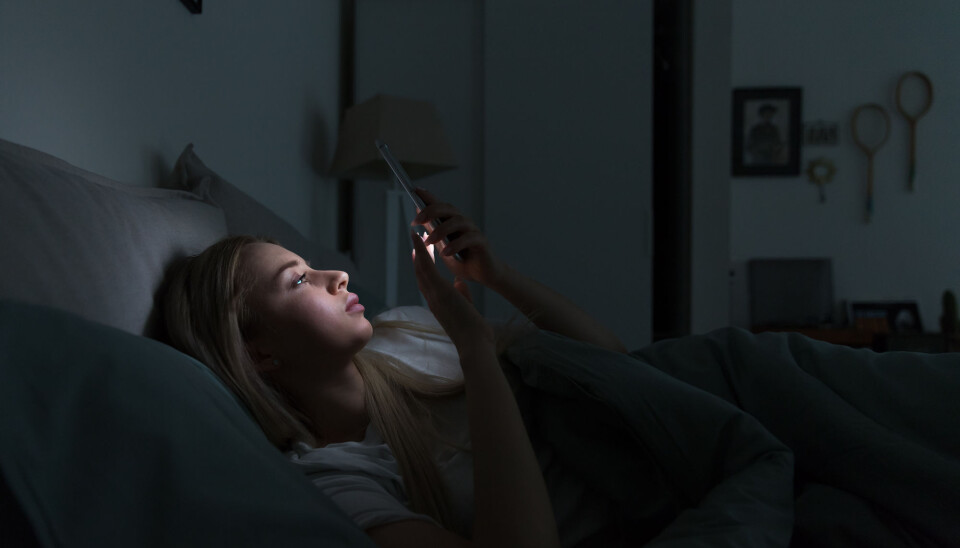
People who have trouble falling asleep have the most anxiety
Insomniacs who struggle to fall asleep at night have higher levels of anxiety than insomniacs with other symptoms, new research shows.
Sleeplessness, or insomnia, takes different forms. Some patients have trouble falling asleep at night. Others wake up very early in the morning, without being able to fall back asleep again. A third group struggles with constantly waking during the night.
Now, sleep researchers who have looked at these three types of insomnia have found differences in anxiety levels in people with the different types.
"Patients who have trouble falling asleep have significantly higher levels of anxiety than those who struggle with waking during the night or waking early in the morning," said the lead researcher behind the new study, Daniela Bragantini, a biologist at the Department of Mental Health at the Norwegian University of Science and Technology (NTNU).
The study was recently published in the journal Sleep Health.
Population-level study
The researchers had access to information from one of the largest health studies ever performed, called HUNT, the Nord-Trøndelag Health Study. This study of residents of the former county of Nord-Trøndelag includes a database with information on nearly 120,000 individuals. In this case, the researchers relied on data collected from 4317 people between 2006-2008 who had reported at least one symptom of insomnia to the HUNT researchers.
A total of 3616 controls, or people who did not have insomnia, were also included in the sleep study.
Participants had completed a questionnaire in which they answered questions about insomnia and also questions about anxiety.
“We compared their responses and saw that people with insomnia generally had a higher level of anxiety than those who slept well at night,” Bragantini says.
People with insomnia are known to suffer from more anxiety and depression than average. But few researchers have studied the differences between different types of sleep problems.
Trouble falling asleep associated with anxiety
People who had trouble falling asleep, whether combined with other types of sleep problems or alone, had the highest anxiety score.
Those who suffered from waking early in the morning, or waking multiple times at night, had lower levels of anxiety.
“It's interesting that having problems falling asleep is more closely related to anxiety than other insomnia symptoms,” says Bragantini.
She said that the anxiety levels in question were not very high and that not everyone needs professional help. But the differences between people with different symptoms were significant.
It seems that people who have trouble falling asleep struggle to turn off their brains.
“Their brains continue to think, even if it really supposed to be time to sleep. It is difficult to say which comes first, anxiety or insomnia — often the two disorders can sustain each other, so that it becomes a circle of stress. Sometimes it may also be that the anxiety comes first, but that the sleep problems become an independent disorder, which does not necessarily disappear even if the anxiety is treated,” she says.
Other research has shown that a patient’s mental disorders often get better when they are treated for insomnia.
Sleep anxiety can cause insomnia
Concerns over how important sleep is can also cause people to feel anxious, Bragantini said.
“It can be easy to think that it is bad for your health if you don’t get your eight hours of sleep. This type of information can be taken out of context and can feel daunting. It can cause people to develop even more anxiety about their lack of sleep, which makes it even more difficult to sleep at night,” she said.
Bragantini and her co-researchers believe a diagnosis of insomnia actually consists of several different subtypes, based on the symptoms the patients have.
“There may be different reasons for different types of insomnia. I am looking into the different biological causes behind these different types of insomnia,” she says.
Consequently, she thinks different types of insomnia may also require different treatment.
“A person who struggles with falling asleep may need treatment for anxiety, while those who wake up very early in the morning may benefit from other types of treatment. We want to continue this line of inquiry,” says Bragantini.
Most often, anxiety comes first
Ståle Pallesen, who is a professor at the Department of Psychosocial Science at the University of Bergen, says it’s not surprising that people who struggle to fall asleep have the most anxiety.
“If you have a lot of worries, and struggle with anxiety, it is not surprising that it can be difficult to turn off your cognitive activity in the evening when you are trying to sleep. Anxiety patients can also have physical symptoms that make it hard for them to fall asleep,” says Pallesen.
He believes that in some cases, having trouble falling asleep can also lead to anxiety.
“Not being able to sleep at night gives you more time to lie there and worry,” he says.
Still, he believes that in most cases, anxiety comes first, and leads to sleep problems in these patients.
Reference:
Daniela Bragantini et al.: Differences in anxiety levels among symptoms of insomnia. The HUNT study. Sleep Health, August 2019






























